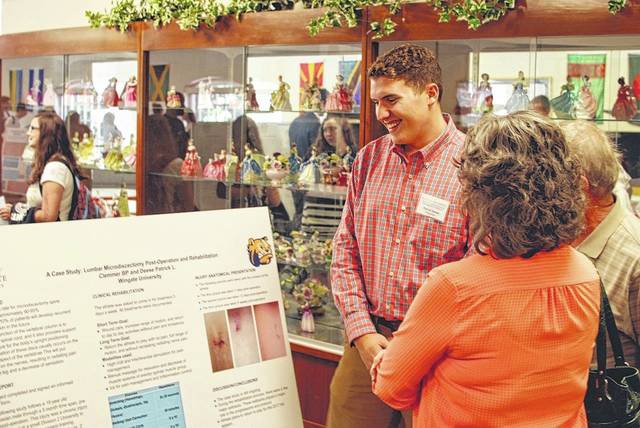WINGATE — Although their presentations haven’t garnered quite the acclaim of TED Talks, nearly 100 Wingate students brought their own “ideas worth spreading” to the University’s 11th annual Creative & Investigative Partnerships Symposium April 19 and 20.
Poster sessions drew crowds to the Ethel K. Smith Library, and audiences packed classrooms to hear oral presentations on topics as varied as shot clocks, breast cancer, Scottish literature and animal husbandry.
Nearly three dozen presenters delved into topics related to athletic training, exercise or rehabilitation. Six presentations homed in on Haiti, while nine speakers addressed perception, perceived values or other aspects of decision-making.
Marisa Ciesluk, dean of Academic Enrichment Programs, said the annual event gives students from all disciplines the opportunity to present their “original research, creative works and community-engagement endeavors” to students, faculty and staff. Oral presentations were 15 minutes each, and poster presenters had two to three minutes to explain their projects. All participants had to register and get sponsorship from a faculty mentor. Ciesluk said the symposium, which usually features 60 to 70 students, this year showcased the work of 93 students, who got help from more than 30 members of the faculty.
Guiseppe Ramirez explored why his native country of Peru has not had the economic success of its southern neighbor, Chile, even though the countries share similar geography, Spanish culture and military-led governments. His research led to an analysis of property rights, foreign direct investment and inflation.
Sophia Rinkert took her audience to early 20th-century Scotland for a view of the often-overlooked “pain and suffering that came with modernization” as portrayed in Lewis Grassic Gibbon’s “Sunset Song.” The novel that some may see as a beautiful, but tragic, coming-of-age tale was truly a political statement, Rinkert said, explaining how Gibbon struck out at technology, war and class division, all threats to the Scotland he knew and loved. She outlined some of the symbolism in the book, explaining the writer’s use of the violent death of farm animals as a symbol of the automobile’s replacing the horse and carriage, his use of historic standing stones to indicate comfort and his main character as a metaphor for Scotland itself. She also discussed scholars’ theories on Gibbon’s stance on nationalism and gave her own analysis, ending her talk with a challenge to her peers.
“I know you are probably wondering what does 1930s Scottish literature have to do with your own life and just what the heck does all this mean?” Rinkert said. “But we all have standing stones, places we go to for comfort; we all have our own revolution and we can all ask ourselves two questions: What will we ultimately have to endure? And what will we leave behind?”
Another presenter in the interdisciplinary segment of the symposium, Alyssa Johnson, asked her audience to consider the poverty of a “single-story perspective,” in a talk titled “The Singular Lens.” Armed with experience from her student teaching at Marshville Elementary, Johnson explained the pitfalls of teachers’ approaching subject matter from only one perspective and gave examples of the need for a more integrated and more globalized approach. Her project examined how the history of the Civil War period is taught in the South as opposed to how teachers in California broach the subject. She also explored World War II from Italy’s and Japan’s perspectives.
“Teachers need to be aware of how to get those other perspectives and narratives out to their students,” Johnson concluded.
Presentations ranged from highly technical to more personal and interpretative. In addition to individual presenters, teams of two, three and four took to the floor to share their research. The event ended with a celebration at the library. All participants received plaques, and special awards went to those judged best in their categories: Vika Arkhipova, Kyle Bromir, Alyssa Johnson, Samantha Hiller, Nathan Hinderer, Sierra Kincaid, Zachary Lewis, Alex Manzewitsch, Veronica Matajaszczyk and Dallas DeSalvo. The library recognized Hinderer as the best presenter in pure and applied sciences and Lewis as tops in humanities.
Terese Lund, assistant professor of psychology, earned the Undergrad Research Mentor Award.
“This was added in 2014 to recognize and show appreciation to those faculty mentors that have given blood, sweat and tears in and out of the classroom to walk students through the process of doing their research and presenting at the symposium,” Ciesluk explained. “Students have an option on their registration form to nominate their mentor, and then they are asked to provide a 500-word statement as to why their faculty mentor should receive the award.”
Those who missed the two-day event can still get a peek at some of the posters that were presented, as they will remain on display at the library.


